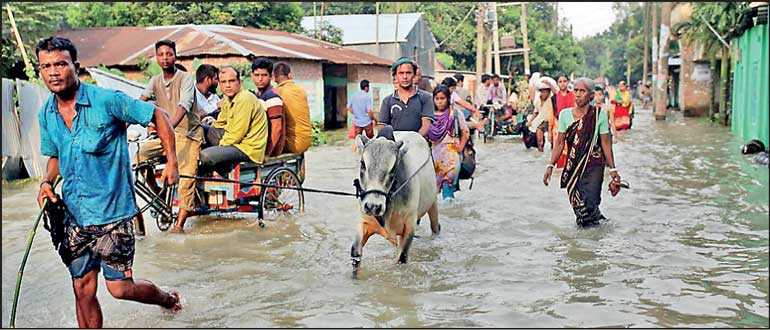Thursday Feb 26, 2026
Thursday Feb 26, 2026
Friday, 19 July 2019 00:00 - - {{hitsCtrl.values.hits}}

Dhaka/Guwahati, India (Reuters) - One of Bangladesh’s main rivers breached an embankment, flooding a northern district and forcing thousands from their homes, an official said on Thursday, as the toll from monsoon rains in neighbouring India climbed to 97 in two flood-hit states.
Several million people are living in camps and makeshift settlements in India’s eastern state of Bihar and north-eastern Assam, officials said, with heavy rains and flooding since last week driving even animals to seek shelter in people’s homes.
The monsoon brings heavy rains to South Asia between June and October, often triggering floods later in the season.
In Bangladesh, the Jamuna River broke through an embankment on Wednesday night, inundating at least 40 villages and displacing more than 200,000 people, government official Rokhsana Begum said.
“We have enough supply of dry food and drinking water but we cannot reach many areas due to high water levels,” said the official in the district of Gaibandha, one of 21 hit by floods.
Inadequate supplies are also a concern in the Indian state of Assam, where more than 5.8 million people have been forced out of their homes, but the situation is improving.
“No fresh areas have come under floodwaters since Wednesday night,” Assam’s health and finance minister, Himanta Biswa Sarma, said.
The state’s Kaziranga National Park, home to endangered one-horned rhinos and tigers, was waist-deep in water, with animals sheltering in higher areas, and some straying into villages.
On Thursday, an adult tiger was found sleeping on a bed in a house on the edge of the sanctuary. “It appears the tiger strayed into a human settlement area to escape the floods and now appears very tired,” park director Shiv Kumar told Reuters. “We are preparing to tranquilise the tiger.”
The floods have killed at least 43 animals, but authorities worry that poachers could take advantage of the deluge to target animals, especially one-horned rhinos, whose numbers are down to about 3,500 worldwide.